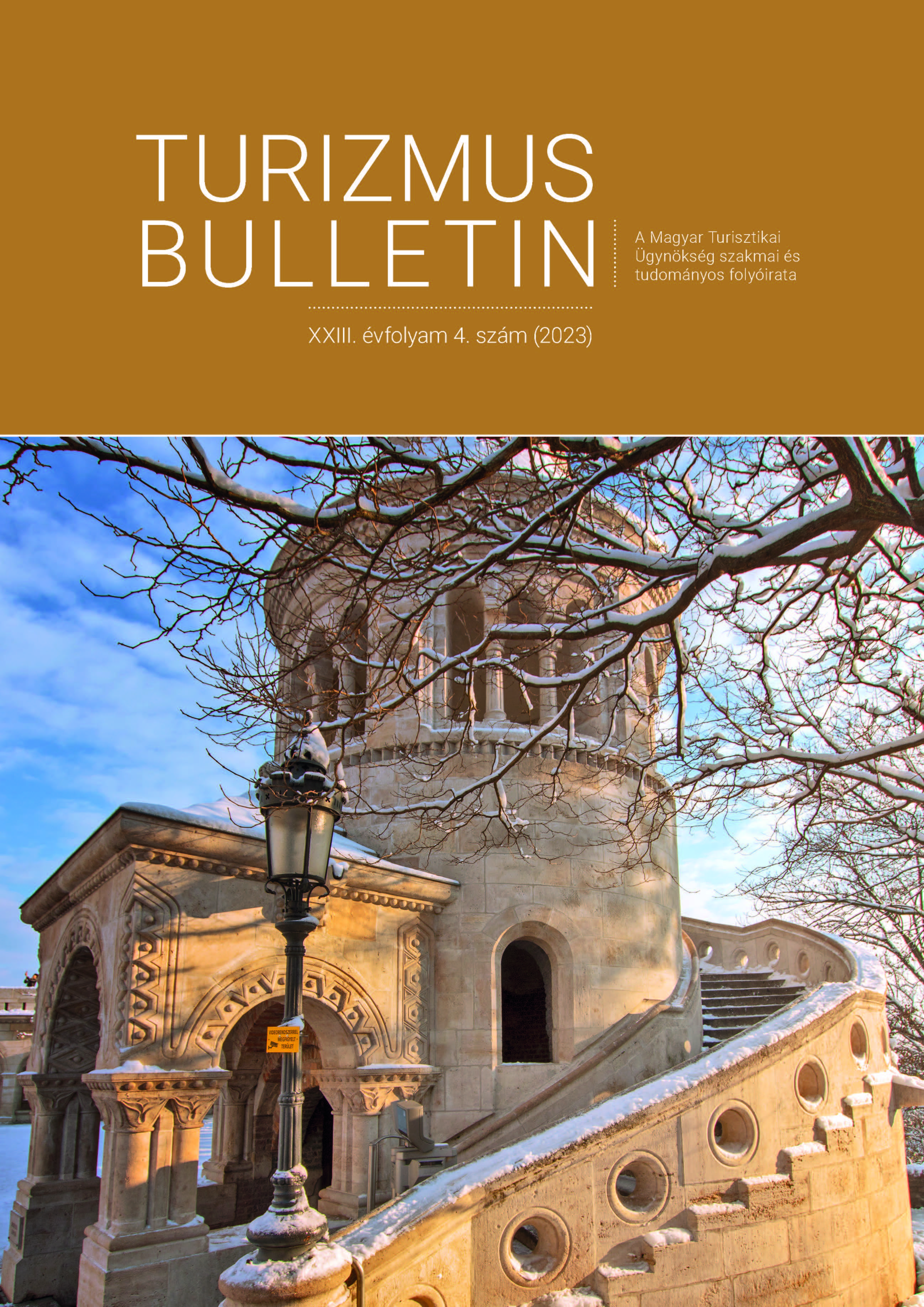Analysing Budapest as a domestic cycling tourism destination
DOI:
https://doi.org/10.14267/TURBULL.2023v23n4.1Keywords:
cycling tourism, domestic tourism, infrastructure, intermodality, BudapestAbstract
The popularity of cycling has increased worldwide as a positive consequence of the Covid 19 pandemic. This trend holds significant potential for the advancement of liveable urban mobility and sustainable tourism. Our study examines Budapest as a domestic cycling tourism destination, with a focus on evaluating cycling infrastructure. Our questionnaire-based research includes responses from 112 participants. We took a sample of residents of both Budapest and its surrounding areas and of rural residents. Based ont he results, the perception of Budapest as an active tourist destination is less favourable among rural respondents, primarily concerning accessibility and the promise of the experience. According to the responses, to enhance the capital’s attractiveness, intervention and development are needed in the quality of the infrastructure, the volume of road traffic and the scope of bicycle-friendly services.
References
BÁNHIDI M. (2006): A sportturizmus kialakulásának történeti háttere. In: Laczkó T. – Bánhidi M. (szerk.): Sport és egészségturizmus alapjai. Pécsi Tudományegyetem Egészségtudományi Kar, Pécs. pp. 6–14.
BENKHARD B. (2023): Növekedés és terjeszkedés, avagy a természetjárás a világjárvány alatt. In: Szalai K. – Michalkó G. – Rátz T. (szerk.): A turizmus válságjelenségei. Turizmus Akadémia (12). Kodolányi János Egyetem – CSFK Földrajztudományi Intézet – Magyar Földrajzi Társaság, Székesfehérvár – Budapest. pp. 103– 116.
CHEN, C.-N. – LEE, H.-L. (2017): How to promote bike tourism globally. Tourism and Hospitality Management. 23(1). pp. 1–16. DOI: 10.20867/ thm.23.1.2
CSAPÓ J. – SAVELLA O. – REMENYIK B. (2011): Aktív turizmus. In: Michalkó G. (szerk.): Turisztikai terméktervezés és fejlesztés. Pécsi Tudományegyetem, Pécs. pp. 91–110.
CSAPÓ J. (2016): Az aktív turizmus keresletének vizsgálata a turizmus legújabb trendjeinek tükrében. START. 1(2). pp. 13–22.
FARKAS, M. – BALOGH, G. (2001): Két kerékkel kevesebb, számtalan eredménnyel több! Turizmus Bulletin. 5(2). pp. 26–33.
HAN, H. – LHO, L. H. – AL-ANSI, A. – YU, J. (2020): Cycling tourism: a perspective article. Tourism Review. 75(1). pp. 162–164. https://doi. org/10.1108/TR-06-2019-0268
JANCSIK A. – JÁSZBERÉNYI M. – KÖKÉNY L. (2019): Az utazásszervezés új dimenziói. Akadémiai Kiadó, Budapest. DOI:10.1556/9789630599535.
JÁSZBERÉNYI M. – KOTOSZ B. (2009): Közlekedési szokások vizsgálata Budapest délnyugati agglomerációjában. Statisztikai Szemle. 87(2). pp. 166–190.
LAMONT, J. M. (2009): Reinventing the wheel: a definitional discussion of bicycle tourism. Journal of Sport and Tourism. 14(1). pp. 5–23. DOI: 10.1080/14775080902847363
LŐRINCZ K. – BANÁSZ ZS. – VIZI I. – PRINCZINGER P. (2020): Kerékpáros turizmus újragondolva – a kerékpáros túraútvonalak és szolgáltatások iránti kereslet felmérése a Balaton kiemelt turisztikai fejlesztési térségben. Turizmus Bulletin. 20(4). pp. 4–14. https://doi. org/10.14267/TURBULL.2020v20n5.1
LUMSDON, L. (2000): Transport and Tourism: Cycle Tourism – A Model for Sustainable Development. Journal of Sustainable Tourism. 8(5). pp. 361–377. DOI: 10.1080/09669580008667373
MENSCHIK, M. (2012): Sustainable Cycle Tourism along the Danube Cycle Route in Austria. Tourism Planning and Development. 9(1). pp. 41– 56. DOI: 10.1080/21568316.2012.653478
MICHALKÓ G. (2004): A turizmuselmélet alapjai. Turizmus Akadémia. Kodolányi János Főiskola, Székesfehérvár.
MICHALKÓ G. (2016): Turizmológia. Akadémia Kiadó. Budapest.
MISKOLCZI, M. – JÁSZBERÉNYI, M. – MUNKÁCSY, A. – NAGY, D. (2020): Accessibility of major Central and Eastern European cities in Danube cruise tourism. Deturope. 12(3). pp. 133–150. DOI: 10.32725/det.2020.025
MITEV A. Z. (2019): Kutatásmódszertan a turizmusban. Akadémiai Kiadó, Budapest. https://doi.org/10.1556/9789634544135
MUNKÁCSY A. – JÁSZBERÉNYI M. (2018): A közúti közlekedés, a városi mobilitás és a turizmus. In: Jászberényi M. – Munkácsy A. (szerk.): Közlekedés, mobilitás, turizmus. Akadémiai Kiadó, Budapest.
MUNKÁCSY A. – VIRÁG Á. – CSENDES B. (2020). Kerékpározás az erdészeti utakon: gondolatok egy kerékpáros turisztikai útvonalak értékelésére szolgáló módszer első alkalmazása nyomán. Útügyi Lapok. 8(13). pp. 61–76. https:// doi.org/10.36246/UL.2020.1.05
PÉCSEK B. (2014): Gyorsuló idő, lassuló turizmus: a lassú turizmus modellezése. Turizmus Bulletin. 16(1). pp. 3–-10.
ROMAN, M – ROMAN, M. (2014): Bicycle transport as an opportunity to develop urban tourism – Warsaw example. Procedia – Social and Behavioral Sciences. 151. pp. 295–301. https:// doi.org/10.1016/j.sbspro.2014.10.027
SULYOK J. – MAGYAR ZS. (2014): Az aktív turizmus helyzete Magyarországon. Fókuszban a kerékpározás és a természetjárás. Turizmus Bulletin. 16(3-4). pp. 15–26.
TOMIK, R. (2013): Active sport tourism – A survey of students of tourism and recreation. Journal of Tourism, Recreation and Sport Management. 1. pp. 13–20.
WESTON, R. – DAVIES, N. – LUMSDON, L. – McGRATH, P. – PEETERS, P. – EIJGELAAR, E. – PIKET, P. (2012): The European Cycle Route Network Eurovelo. Study. European Parliament, 2012.
ZÁTORI A. (2014): Élményszemlélet a turizmusban. A turisztikai élményteremtés koncepciói. Turizmus Bulletin. 16(2). pp. 51–60.
Internetes források
ASCHAUER, F. – GAUSTER, J. – HARTWIG, L. – KLEMENTSCHITZ, R. – MESCHIK, M. – PFAFFENBICHLER, P. – WIEBKE, U. (2021): Guidelines for sustainable bicycle tourism. EU, Institute for Transport Studies. Wien: Interreg Danube. https://www.interreg-danube.eu/uploads/media/approved_project_output/0001/45/ babfe28a4c4be2f1067cc66522bf9de4dbb11913.pdf, Letöltve: 2023. április 21.
BRIT KÖZLEKEDÉSI MINISZTÉRIUM (2020): Fokozatváltás. Merész jövőkép a kerékpározásról és gyaloglásról. https://aktivmagyarorszag.hu/ wp-content/uploads/2020/06/Fokozatvaltas.pdf Letöltve: 2023. április 21.
HÜRTEN, D. (2009): Radtourismus in Deutschland: Wertschöpfung und Zielgruppen. Gründungskongress: Landesbündnis ProRad. https://www.km-bw.de/site/pbs-bwnew/get/documents/KULTUS.Dachmandant/ KULTUS/Dienststellen/lis-in-bw/pd f/LIS_ Radtourismus%20in%20Deutschland%20-%20 Wertschpfung%20und%20Zielg r uppen%20 %28Dr.%20Dennis%20Hrten%29.pdf, Letöltve: 2023. április 21.
MAGYAR TURISZTIKAI ÜGYNÖKSÉG (2017): Nemzeti Turizmusfejlesztési Stratégia 2030. https:// mtu.gov.hu/cikkek/strategia/, Letöltve: 2023. április 21.
MEDIÁN (2018): Így bringázik Magyarország 2018. Reprezentatív kutatás. https://kerekparosklub.hu/ kerekparoskutatás_2018, Letöltve: 2023.04.21
MEDIÁN (2020): This is how Hungary cycles in 2020. National representative survey. https:// kerekparosklub.hu/kerekparoskutatas_2020, Letöltve: 2023.04.21
MEDIÁN (2022): Így bringázik Magyarország 2022. Reprezentatív kutatás. https://kerekparosklub.hu/ kerekparoskutatas-2022, Letöltve: 2023.04.21
ORIHUEL, M. (2021): Reimagining the way we travel to address climate change: Cycling tourism as an ally. https://ecf.com/news-and-events/news/reimaginingway-we-travel-address-climate-change-cyclingtourism-ally, Letöltve: 2023. április 21.
SZÁNTÓ Z. (2021): Mivel lehet Budapestre csábítani a vidéki turistákat? https://turizmus. com/szabalyozas-orszagmarketing/mivel-lehetbudapestre-csabitani-a-videki-turistakat-1175510, Letöltve: 2023. április 21.
TORNOW, A. (2021a): Transporting bicycles on coaches – Inter-modality mini-series 3/3. https:// en.eurovelo.com/news/2021-08-26_transportingbicycles-on-coaches-inter-modality-mini series-3-3, Letöltve: 2023. április 21
TORNOW, A. (2021b): Transporting bicycles on trains – Inter-modality mini-series 2/3. https:// en.eurovelo.com/news/2021-07-16_transporting bicycles-on-trains-inter-modality-mini-series-2-3, Letöltve: 2023. április 21.

